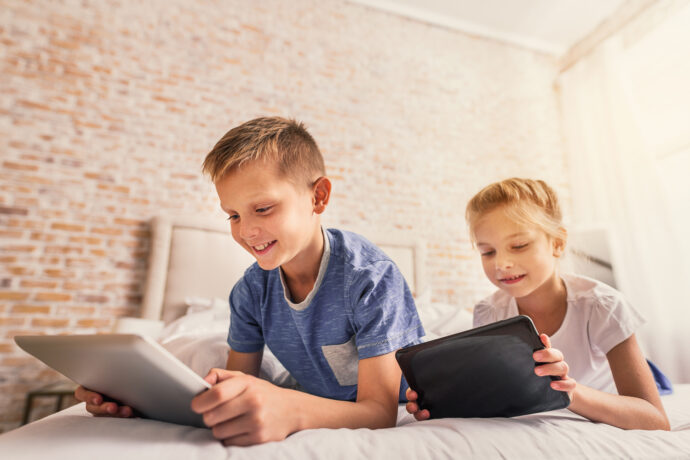Every school day, around 3:30 p.m., I start the rundown. The house gets a quick tidy. I set out graham crackers and milk. My dog, Hosmer, positions himself at the back door. And I wait for two small boys with giant backpacks to come crashing home from school. They arrive and chatter at me, all the while strewing their shoes, backpacks, hoodies, and lunchboxes all over, like rogue interior designers. I remind them, for the kajillionth time, to pick up their stuff. And they pester me, for the kajillionth time, about screen time.
Their squirrelly little brains have been very busy at school, for eight hours straight, and as much as I prefer the idea of a gentle decompression after a busy school day, I’ve never known squirrels to opt for a good book and some Mozart to help them relax. Instead, my boys want nothing more after school than to maneuver a pixelated man through dimly lit mazes. Personally, I don’t get it. But then, I like YouTube videos where women find great deals at Goodwill, so I’m not judging.
The problem with screens is that they make us lazy. There, I said it. They make my children melt into the couch with facial expressions akin to glazed donuts, oblivious to the world. We know that. We have studies and articles and all sorts of research and data (Steve Jobs didn’t allow his own children to have iPads, for pete’s sake) that tell us that screens are a problem. But what those articles don’t really touch on is how much screen time affects me.
First of all, there’s the obvious answer: screen time = peace and quiet. As a freelance writer and author, I love peace and quiet. I am also an introvert who jumps at loud noises (are these two things related?). I have a Pandora station called “Be Very Quiet.” I have large, puffy headphones that make me look like a DJ and blanket all chaos in muffled loveliness. I get irritated when my husband chews too loudly. So, I like quiet. Television shuts my kids down into contained little lumps of quiet.
But that’s the easy answer. What’s tougher to admit is how those screens take the pressure off my parenting. Screens are the happy-makers, after all. When dissension, anxiety, or—worst of all—boredom rears its ugly head in our house, a screen covers it all in a warm and cheery glow with a laugh track.
And here’s the toughest part to admit: I have parented for ten years now, and I have weathered sickness, worry, and fear. My children and I have struggled through tough times with all sorts of challenges and mishaps and hard choices. And I would like to think most of those challenges have been worked through with grace and God’s help. But I am still finding my boys’ monotonous, daily bickering to be one of the most difficult aspects of parenting. I hear rumblings of a petty argument from my boys, and I tense up, poised and ready to interfere, intercede, fix. And I can fix it. I can swoop in, administer consequences and motivational speeches, and squelch the whole scene before it really gets revved up. I can deal with the picky fights like a woman with a can of Raid, ready to annihilate any pest.
But throw some screen time in there, and the squabbling never happens in the first place. And that’s the addiction. My boys are just happier with screens. It’s more peaceful. It all works out. No one gets sprayed by insect repellant. All is good and well in the land.
Right?
You know the answer to that one.
Just like the smoke and mirrors presented to us on the television, the happiness that screen time offers is illusory. On any given afternoon, after an hour or so of video games, my children become . . . wonky. They stumble about and flop back on the couch with all the energy of a deflated balloon—a sullen balloon, at that. They’ve forgotten how to do menial tasks, or play Monopoly. They’ve forgotten how to speak, unless it’s asking for food or cash. They’ve become illiterate and listless. It’s awful. They have, essentially, become Lumps of the Highest Degree.
Also, they have absolutely no idea how to deal with the other Lumps in the room. And neither do I. Screen time seems to hamper any ability to work through those nagging annoyances that are part of life—like math homework, or a brother’s uncanny ability to always scoop up all four Monopoly railroads, or whining about dinner.
One particularly Lumpy afternoon, my husband and I were in the kitchen, and we heard it. The boys were starting in on an epic throwdown about who was looking at the other one with the wrong tone of face. I was placing glasses on a shelf, froze mid-reach, and sighed heavily. I started to leave the kitchen when Brian asked innocently, “Are you going up there?”
I waved my hands helplessly in their direction and said, “Well, yeah. They’re fighting!” And then he did something unforgivable. He chuckled.
“Dana. Get used to it. They’re brothers. As long as no one is brandishing sharp objects, I think we’re okay.”
My eyebrow twitched. I waved again, helplessly, in the direction of the squabbling, now desperately wanting to squabble with my husband. But alas—he was right.
The main hurdle was simply my fear of irritation; of the nagging itch that is family relationships; of our endless, squirmy humanness.
We cancelled screens that day. And no one died. The pestering and whining hit an all-time high for about forty-eight hours, and then the magical reset happened. My boys actually managed a Monopoly game for an hour before the meltdown. Henry packed the game up and hid it in the kitchen, muttering, “I’m not gonna play this thing anymore,” and I kinda had to agree. But we managed. We got through. We dealt with each other.
Screens are not evil. We love our Friday movie nights. We allow computer time. Brian and I finessed our screen-time rules and boundaries, and we allow for glassy-eyed viewing on weekends—for a bit. But the main hurdle was simply my fear of irritation; of the nagging itch that is family relationships; of our endless, squirmy humanness. Less screen time equals more human time, after all. It’s not nearly as cinematic, and nothing ever, ever gets solved in thirty minutes, but it’s better.








0 Comments